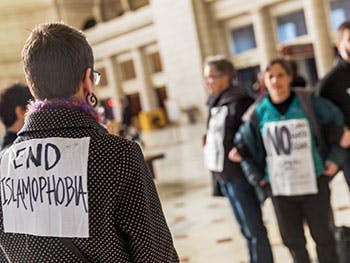UNIVERSITY NEWS LAST UPDATED : 18 OCTOBER 2017

Research presented at the House of Commons today (Wednesday 18 October) will unveil the shocking experiences of verbal, physical and emotional attacks against non-Muslim men, accused of being associated with ISIS on the basis of their physical appearance and attributes.
Islamophobia experts Dr Imran Awan and Dr Irene Zempi will address the ‘All Party Parliamentary Group on British Muslims’ during Hate Crime Awareness Week with details of the interviews they conducted with males across the UK.
Participants disclosed how animal excrement had been pushed through their door mailboxes and that family businesses had been damaged.
The aims of the research were to examine the nature of anti-Muslim hate crime directed towards non-Muslim men, as well as considering the impact of such hate crime upon victims and the coping strategies used when faced with such volatile experiences.
Participant ages ranged from 19 to 59 and interviews were conducted with males of black, white and Asian ethnicity. In terms of faith and belief, participants included those of Sikh faith, Christian faith, Hindu and Atheist backgrounds.
“There has been very little research conducted into the experiences of non-Muslim men who suffer Islamophobia because of how they look” said Dr Awan, associate professor of Criminology at Birmingham City University.
“Dr Zempi and I will be presenting our research before politicians today and hope that our recommendations will be considered seriously into how we can create further awareness of these awful hate crime attacks and interventions to reduce their severity.”
Participants interviewed by Dr Awan and Dr Zempi discussed how they believe their skin colour and facial hair contributes to being perceived as Muslim.
One interviewee said: “On a daily basis I get people on the streets calling me ‘traitor’ and ‘ginger terrorist’ because of my beard. They think I’m a Muslim, a convert to Islam but I’m not, I’m an Atheist.”
Another participant said: “It’s happened to me ever since I grew a beard. I sit down on the bus and there are people who need a seat, but they never sit next to me.”
“Because of my beard, I need to explain why I have this and that I’m not a Muslim”, said another participant. “I think ‘why do I need to prove who I am?’ Every second, every minute, every day I have to prove myself.”
“We found that participants constantly felt the need to prove their identity as an attempt to prevent future victimisation” said researcher Dr Irene Zempi, lecturer in Criminology at Nottingham Trent University.
Participants also noted how Islamist terrorist events around the world led to an increase in anti-Muslim hate crime attacks against them and their families.
“Every time there’s a major terrorism incident there’s a sharp rise in hate directed to me and my family”, said an interviewee.
“The last incident included being verbally abused by a taxi driver”, said one participant. “When I got into the car, he said ‘get out! I don’t put Muslims in my car’. I told him I wasn’t Muslim but then he came and dragged me out the car.”
Researchers Dr Awan and Dr Zempi’s recommendations include making public transport safer with increased public awareness campaigns, as well as reviews into how religiously motivated hate crimes are recorded by the police.
Image credit - Lorie Shaull